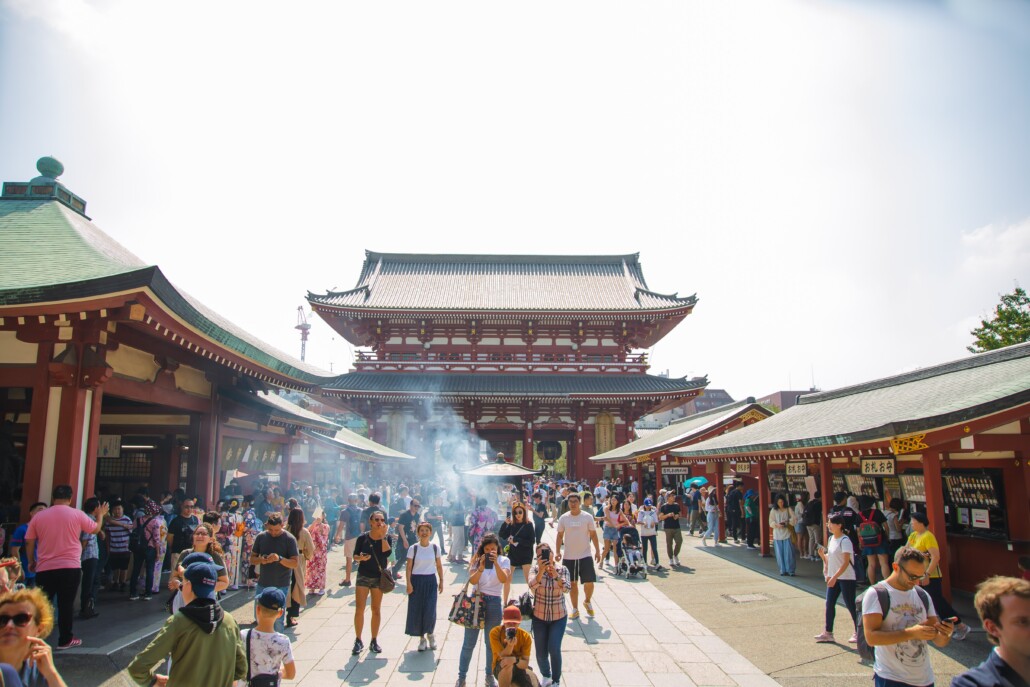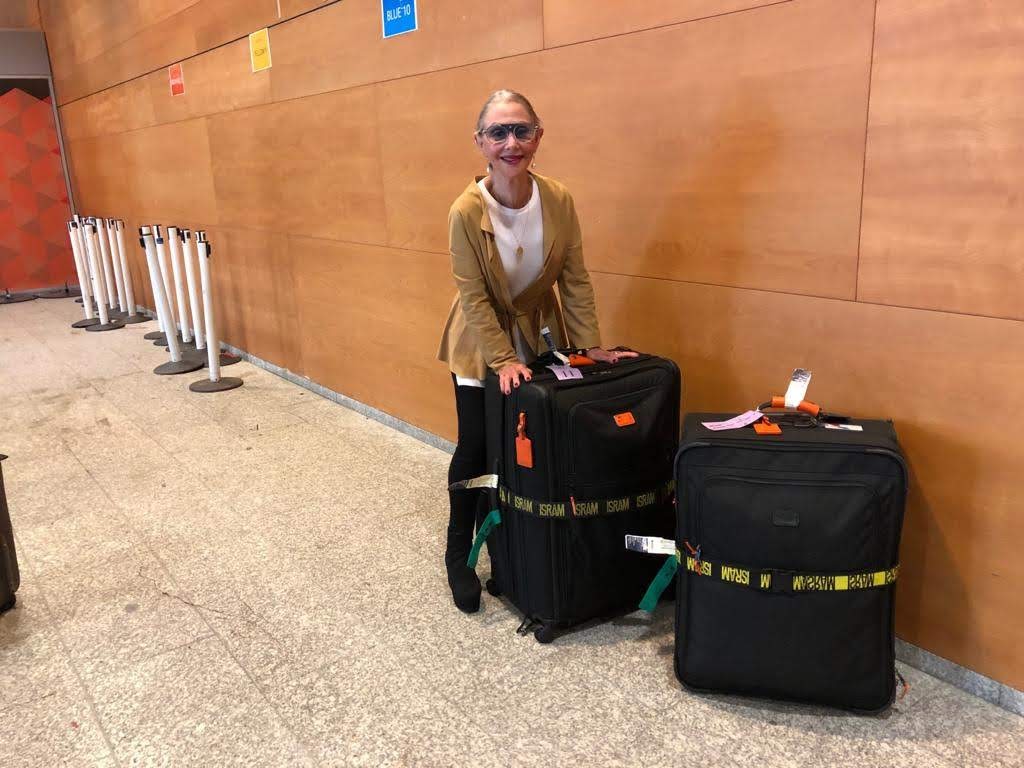Today’s post on the important topic of travel scams was well-researched and written by travel expert Sandra Roussy who has written for publications such as Fodor’s Travel and was published in the NY Times best-selling book Eat Pray Love Made Me Do It! Please read up on how to avoid travel scams so that you are prepared and can relax and enjoy your next trip! Enjoy and bon voyage!

When you understand the potential for travel scams, you can have peace of mind on your travels.
*Affiliate Disclosure
Tourist scams can occur worldwide, from modern cities to serene vacation spots, and falling victim to these scams can result in financial loss, stolen belongings, or a sense of betrayal. As you prepare your trips and venture out into your travels, it’s important to be aware that there are individuals who see tourists as easy targets for their deceptive schemes.
Sadly, solo older women travelers may be a particular target!
Let’s explore various travel planning scams and on-the-ground travel scams (here are my favorite belt bags that are safer for travel), provide insights on how to identify and avoid them, and offer practical tips to help you stay vigilant and protect yourself from falling prey to these deceptive practices.
It is unfortunate that we, as older women, can be particularly vulnerable to travel scams. However, it is crucial to emphasize that with awareness and preparation, you can have perfectly safe and enjoyable travel experiences and minimize the risks associated with tourist and vacation scams.
If you’re planning a trip, you’ll want to read Honey’s Best Packing Tips and Travel Must-Haves!
Before Your Trip: Common Travel Planning Scams

Travel scams should not stop you from experiencing the wonders of the world. However, it’s important to arm yourself with knowledge.
Here are a few common travel planning scams that you may encounter while you are in the preparation phase of your trip.
Fake Travel Websites and Travel Agencies
Scammers create fraudulent travel websites and travel agencies that mimic legitimate ones, offering attractive deals on flights, accommodations, and packages. However, they often take your money without providing the promised services.
To determine if a travel site is real and trustworthy, you can follow these steps.
1. Research the website
Look for reviews, ratings, and feedback from other travelers. Reputable travel review platforms or forums like Tripadvisor and Lonely Planet can provide valuable insights into a site’s reliability.
2. Verify contact information
Legitimate travel websites usually provide clear and valid contact information, including a physical address, phone number, and email address.
3. Check for secure connections
Look for a padlock symbol in the address bar and check if the web address begins with “https” instead of just “http.” This indicates that the site encrypts your data and offers a secure browsing experience.
4. Read the terms and conditions
Carefully review the terms and conditions, cancellation policies, and refund policies of the travel site. Valid websites typically provide clear information about their policies and procedures.
Nonexistent Vacation Rentals Travel Scams
Scammers may advertise vacation rentals on classified websites or social media platforms that don’t actually exist. They may request payment in advance or ask for personal information, leading to financial loss or identity theft.
It’s advisable to use trusted vacation rental websites and platforms like Airbnb and Vrbo that verify property listings and provide traveler protection. Reading reviews from previous guests can give you insights into the legitimacy and quality of the property.

Is it a vacation scam if it seems too good to be true? Maybe.
Timeshare Scams
Some scammers target travelers by offering free gifts, discounted vacations, or prizes in exchange for attending a timeshare presentation. However, these presentations can be high-pressure sales tactics to get you to invest in a timeshare that may not be as valuable or flexible as promised. Be cautious when approached with such offers and carefully evaluate the terms and costs involved.
Visa and Immigration Scams: The “Pass-Travel-USA”
The “Pass-Travel-USA” scam involves fraudulent websites or agents offering fake visas or other travel documents. To avoid falling victim to this scam, it’s vital to rely only on official government sources or authorized visa service providers when applying for travel documents.
Travel Insurance Scam
When purchasing travel insurance, opt for well-known insurance providers or consult with trusted travel agencies. Review the policy coverage, including cancellation and medical coverage, and ensure that it meets your specific needs. Research the reputation of the insurance company and read customer reviews or seek recommendations from fellow travelers.
Robocall Scams
Robocalls about travel typically involve automated phone calls that target individuals with offers or promotions related to travel services. These calls are often made in large volumes and may use pre-recorded messages or automated voice systems to deliver their pitch.
Here Are Some Common Themes for Robocalls About Travel

One of the most common travel scams starts as a robocall.
1. Vacation packages – What to do when you win a “free” vacation
Scammers may claim that you’ve won a free vacation or offer discounted travel packages to popular destinations. They may ask for personal information, a payment installment, and attempt to sell you fraudulent vacation deals.
2. Timeshare Resales or Upgrades
Robocallers may contact timeshare owners, claiming they have a buyer interested in purchasing their timeshare or offering an upgrade to a better property. They may request upfront fees for listing the timeshare or completing the transaction, but their intentions may be to scam unsuspecting owners.
3. Flight or Hotel Deals
Some robocalls target individuals by promising exclusive discounts on flights, hotels, or vacation rentals. They may use high-pressure tactics to persuade you to provide personal information or make immediate payments.
Legitimate travel providers typically do not rely on robocalls to market their services. If you receive such calls, it’s advisable to hang up and avoid engaging with the scammers.
On Your Trip: Avoiding Common Travel Scams

Some of the most common travel scams can seem the most innocent.
Travel scams can be found in various parts of the world, and travelers need to be aware of them to avoid falling victim. Here are some of the most common scams that you may encounter while traveling.
1. Taxi Overcharging
First up, taxi drivers in certain destinations may try to overcharge tourists by taking longer routes or not using the meter. Always ensure the taxi meter is used or agree on a fare before starting the journey.
Try to use services like Uber whenever it’s available. One of the reasons is that Uber fares are predetermined, providing transparency and also eliminating the need for cash transactions.
2. Pickpocketing and Bag Snatching
Thieves may target crowded tourist areas, public transportation, or busy markets to steal wallets, passports, and other valuables. Keep your belongings secure and be cautious of your surroundings.
3. Fake Police Officers
Scammers posing as police officers may approach tourists, claim there is a problem, and ask to see identification or search their belongings. Always ask for official identification and, if in doubt, insist on going to the nearest police station.
4. Currency Exchange Scams
Be cautious when exchanging currency, especially in unofficial or street-level exchanges. Scammers may shortchange or use hand schemes to confuse you during the transaction. Stick to reputable exchange offices or banks.
5. Fake Attraction Closures
Beware of scammers who may approach you with false information about popular tourist attractions being closed or under renovation. They will try to divert your attention by suggesting alternative attractions or services and may even offer to sell you tickets or provide personal transportation to these supposed alternatives.
Verify the information with official sources or your hotel before making any changes to your plans.

When dealing with street vendors, a little street smarts can help you avoid this common travel scam and know what to watch for.
6. Street Vendor Scams
Some street vendors may try to sell counterfeit goods or charge inflated prices to unsuspecting tourists. Always be cautious, compare prices, and ensure the quality of the products before purchasing.
7. Street Gambling Games
Scammers may set up games on the street that seem easy to win, enticing tourists to participate and bet money. These games are often rigged, and you’ll end up losing your money. Your best bet is to avoid participating in street gambling games.
8. Liquid Spill
To create a distraction, the scammer acts in a hurry or purposely bumps into you. While you are momentarily distracted, they intentionally spill a liquid substance on your clothing, such as mustard, ketchup, or a mixture resembling bird droppings.
Seizing the opportunity, the scammer quickly steps in, appearing helpful and concerned. They offer to clean the stain using tissues or a cloth, getting close to you physically. Meanwhile, they take advantage of the situation to pickpocket or discreetly steal your belongings.
9. Fake Transportation Officials
Scammers may approach you at transportation hubs, claiming to be transportation officials or staff, and offer assistance with tickets or baggage. Use official ticket counters and be cautious of unsolicited help.
10. Rental Scams
When renting vehicles or equipment, scammers may charge excessive fees for damages that were pre-existing. Thoroughly inspect the item and document any existing damages before renting. It’s best to stick with well-known rental companies.

Don’t ride the wave of panic, the most important part of travel is to be in the moment and enjoy it! Being prepared will help you achieve the necessary calm when traveling.
11. Distraction Techniques
Scammers may work in pairs or groups, with one person distracting you while another steals from you. Stay vigilant in crowded places, particularly around tourist attractions and public transportation.
12. Hotel Scams
Scammers may call hotel rooms, pretending to be front desk staff, and request credit card information for verification purposes. Always confirm with the front desk in person or through a trusted phone number.
13. Ticket or Tour Scams/Fake Tour Guides
Be cautious when purchasing tickets or booking tours from unauthorized or unfamiliar sources. Some scammers may sell fake tickets or overcharge for services.
Scammers posing as tour guides may approach tourists and offer their services. They may take you to overpriced or low-quality establishments where they receive commissions. Always use reputable tour operators or research and book in advance.
14. “Helpful” Locals
Next up, beware that some individuals may approach tourists, claiming to be locals or tour guides, and offer assistance or directions. While most people are genuinely kind, be cautious of those who may lead you to a specific shop or establishment where they earn a commission.
15. Fake Charity or Donation Requests
Scammers may approach tourists, especially near popular attractions, claiming to represent charitable organizations or causes. Be cautious when donating and research the legitimacy of the organization before contributing.
16. Friendship Bracelets & Flowers
Lastly, n popular tourist areas, scammers may approach you with a friendly gesture like tying a bracelet around your wrist or offering you a flower. Once engaged, they may demand payment or pickpocket while distracting you. Avoid engaging with such individuals.
Remember, staying informed and using common sense is key to avoiding scams while traveling. Research your destination beforehand, be skeptical of unsolicited offers, and trust your instincts if something feels suspicious. If something feels too good to be true, it probably is — it’s always best to err on the side of caution.
How To Find Out About Travel Scams

There are several reliable sources you can turn to if you want to learn more about travel scams.
Avoid Travel Scams by Checking Government Travel Advisories
Check the travel advisory or consular services section of your country’s government website. They often provide information on common scams and safety tips specific to various international destinations.
Research on Trusted Travel Forums, Blogs, and Websites
Visit travel forums and websites where fellow travelers share their experiences and warnings about scams they have encountered. Platforms like TripAdvisor or Yelp can be helpful in gaining insights from firsthand accounts.
Also, read travel blogs and guides that cover your destination. Many travel bloggers share tips and advice on staying safe, including information about prevalent scams in specific locations.
Remember to use reliable and up-to-date sources to ensure the information you gather is accurate and relevant.
Tips to Stay Safe from Travel Scams While Traveling

You can take several measures to stay safe from scams while traveling.
1. Research Your Destination
Before your trip, thoroughly research your destination, including the local customs, common scams, and areas to be cautious in. Stay informed about any recent tourist scams reported in the area.
2. Use Secure Bags and Wallets
Think about investing in a secure, anti-theft bag or purse with slash-resistant straps and RFID-blocking technology to protect against pickpocketing and electronic theft. Also, keep your belongings close to your body and avoid displaying valuable items. Here are two travel wallets that I love: This RFID-Blocking minimalist card case in a fun red color, and this RFID-blocking passport and vaccine card holder travel wallet.
Use a cross-body or belt bag and always be aware of distractions. Check out this video on Instagram that Honey did showing off all of her favorite belt bags!
3. Stay in Reputable Accommodations
Choose well-reviewed accommodations that prioritize security and guest safety. Read reviews and ratings from other travelers to ensure a safe and comfortable stay.
4. Be Cautious with Personal Information
Avoid sharing personal information with strangers, especially regarding your accommodation, travel plans, or financial details. Be discreet when handling documents like passports and credit cards.
5. Use Reliable Transportation
Opt for trusted transportation such as licensed taxis, popular ride-sharing services, or public transportation. Be cautious of unmarked taxis or drivers who approach you unsolicited.
6. Trust Your Instincts
If a situation feels uncomfortable or suspicious, trust your intuition and remove yourself from it. Don’t be afraid to say no or walk away from any offers or interactions that don’t feel right.
7. Stay Aware and Alert
Maintain situational awareness at all times. Be mindful of your surroundings, especially in crowded areas, and keep an eye out for any questionable activities or individuals.
By staying informed, prepared, and cautious, you can minimize the risks and enjoy a safe and enriching travel experience.
How to Report a Travel Scam

If you have been a victim of a travel scam or suspect fraudulent activity, it’s important to report it to the appropriate authorities. Here’s where to go.
Local Law Enforcement
Start by reporting the scam to the local police or law enforcement agency in the location where the incident took place. Provide them with all relevant details, including any evidence or documentation you have.
Online Reporting Platforms
Many countries have online reporting platforms or websites specifically designed for reporting tourist scams and fraudulent activities. These platforms allow you to submit detailed information about the scam, including any supporting evidence.
Financial Institutions
If you made any payments related to a scam, notify your bank or credit card company immediately. They can guide you on the necessary steps to protect your financial accounts and potentially initiate a fraud investigation.
Reporting scams not only helps in seeking justice for yourself but also contributes to preventing future victims from being targeted by the same scammer or dishonest operation.
Most Importantly, Don’t Forget to Enjoy Your Travels!

When traveling, yes, you must be aware of travel scams, but you must also keep to the sunny side of the street. And if it rains, take Honey’s advice and bring along a fabulous umbrella!
With all this being said, there is certainly no need to fear traveling and going to new places. While it’s essential to be conscious that tourist scams exist, particularly in popular tourist destinations, this article is by no means created to spread fear-mongering.
There is no need to become overly fearful and paranoid while traveling. By simply being aware of these travel scams and staying informed, you can maintain a sense of control and take proactive measures to keep yourself and your belongings safe.
Remember, the key is to strike a balance between caution and enjoying your trip.
Safe travels!

About the author:
After dedicating over two decades to designing collections for fashion brands like La Senza, Victoria’s Secret, and JACOB Lingerie, Sandra made a bold decision to upend her life and pursue her passions for writing and traveling. She fearlessly sold all her possessions and embarked on a life-changing journey of rediscovery. Sandra’s deeply personal essay, titled “Someone Like Me,” caught the attention of bestselling author Elizabeth Gilbert and earned its place in the celebrated New York Times bestseller, “Eat Pray Love Made Me Do It.”
Today, Sandra lives in Mexico as a freelance writer, rescuing and caring for animals along her path. Her pen effortlessly led itself to write about travel and lifestyles catered to women over 50 because her transformative journey can serve as a reminder for other women over 50 that they can welcome change, confront fears, and pursue their dreams at any age.
Visit her website: www.sandraroussy.com
*Some items purchased through links on this site may result in a small commission for Honey Good. This helps with the cost of running this website and is at no additional cost to you.
+ show Comments
- Hide Comments
add a comment